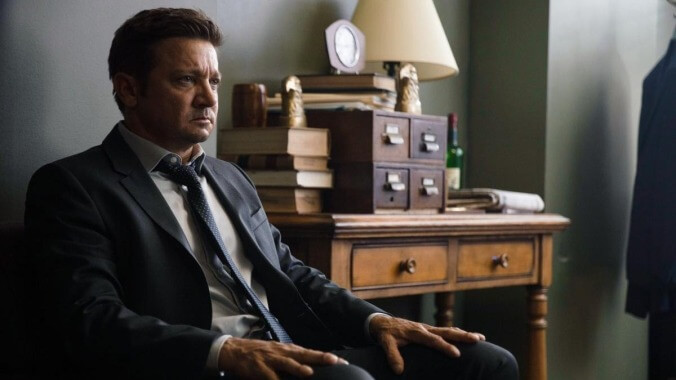The series premiere does clear up one question right away: “Mayor of Kingstown” is just a sobriquet, but the position is as integral to the workings of the fictional Michigan town as the person who actually holds that office. The ersatz mayor is part kingpin, part pillar of the community; he trades in favors, dines with cops and drug dealers, and has a soft spot for women in need. He’s the kind of guy who will plant a weapon or drugs on some unlucky person one moment, and give some equally unfortunate soul money to grab dinner the next. He’s complicated.
But Mike does have some kind of code, one he struggles to hang on to the longer he holds the mantle of mayor of Kingstown. It’s not an uncommon dilemma in a place where there are seven prisons in a 10-mile radius. Incarceration isn’t just Kingstown’s only major source of industry; it’s also one of a limited number of paths available to most residents. No wonder Renner grimaces as often as he breathes on the show.
The McLuskys are, in a sense, one of the most prominent families in Kingstown. Kyle Chandler plays Mitch, the abundantly charming older brother (a role he’s inhabited before), while Taylor Handley co-stars as Kyle, the youngest McLusky and the only cop in the family. What looks to be a familiar Hollywood story about scant opportunity—you either become a crook or a cop—quickly becomes something else. Kyle is happy to look the other way when it comes to Mitch and Mike’s fixing; at one point, he’s literally along for the ride.
The real source of family tension comes from Mike’s relationship with their mother Miriam (Dianne Wiest, once more wearing flowy tops while talking about the criminal legal system). But even that dynamic is difficult to parse; at first, she seems hurt by the fact that he wants to leave Kingstown, despite that being a perfectly reasonable thing, given the circumstances. Then she tells him she doesn’t buy his “defender of the less privileged” act: “You’re couriers. Fix-it men. Part-time gangsters. And you think because you don’t make much that it’s noble.”
The first three episodes are replete with that kind of superficially meaningful speech, followed by an equally insubstantial response. Sheridan and his writers deal so much in shades of gray and blurred lines that it becomes impossible to make out any of the larger themes. The show doesn’t really try to defend or delve into any particular position; several storylines acknowledge corruption and systemic inequities, but that’s the extent to which those topics are addressed. The only real takeaway is that life is terrible in Kingstown, no matter who you are—though, of course, it’s considerably worse for those who are incarcerated. But that reality is established early on, and rarely examined further.
Mayor Of Kingstown veers as frequently into the high-octane, morally murky terrain of shows like Sons Of Anarchy (in which Sheridan once co-starred), as it does the sprawling exploration of The Wire, which followed the money—and the crime—from the streets to the most august of places. It never settles comfortably into either approach, just as Mike wavers between the “legitimate” world and Kingston’s underbelly.
There is potential in centering Mike’s story; as the only McLusky brother to have been through the prison system, he has insights and resentments they don’t. When he talks of the “rats tearing each other apart in cages,” it’s a particularly dehumanizing way to describe those who are incarcerated. The question is whether Mike truly looks at them that way, or if it’s self-loathing or a way to distance himself. He shows greater compassion than his brothers, but also anger.
Renner mostly looks chagrined throughout, but there are times when he comes across as the kind of lower-level defender from the Netflix Marvel shows—a flawed, conflicted person who still tries to help others. At one point, Mike is hired by the family of a man on death row to guide them through his execution. He then runs into a family member of the murdered girl, and reflexively consoles him. It’s easy to think he’s playing both sides (he’s being paid by at least one), but there’s also a clear desire to be there for both families.
The scene is the first to truly make you want to learn more about Mike, but its quietness is soon drowned out by all the byzantine plotting and requisite violence of a would-be prestige crime drama. Mayor Of Kingstown’s big plans ultimately undercut its real promise.



 Keep scrolling for more great stories from A.V. Club.
Keep scrolling for more great stories from A.V. Club.